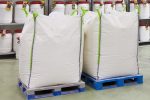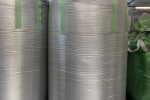
Emballages pour la vente au détail de produits
our speaker: industry expert Amir Samadijavan
11 October 2021
Sustainability plays a key role in ensuring consumer confidence and, hence, sales into growing markets. Sustainability of materials and articles that come in contact with food is now increasing in the top ranking of features that led the consumers’ choices, and recyclability is part of it. But when exactly is a packaging material recyclable?
Todays topic focused on ‘the status of usage recycled materails for FIBC’s and its impact on footprint’.
NNZ invited Amir Samadijavan to talk about usage of recylced rPET for FIBC’s and to demonstrate the NNZ tool for calculation of environmental impact.
Join us in our journey to reshape the FIBC industry with rPET BigBag‘s!
Using rPET FIBC’s will help our industry to meet sustainability goals set out by the UN and boost the circular economy by increasing recycled content of material.
We are looking for partners in the UK, The Netherlands and Scandinavia to test and experience the benefits of using rPET FIBC’s as a sustainable alternative to virgin PP FIBC’s. The rPET FIBC’s are certified, made from 96% recycled PET, recyclable and originate from a fully certified production facility with EFSA (European Food Safety Authority) approval in progress. The rPET fabric and FIBC’s are produced in Europe and we have different sizes of FIBC’s on stock for testing in your facilities. Interested? Please be invited to connect with us.
"*" indique les champs obligatoires
Ces cookies sont utilisés pour optimiser les performances et les fonctionnalités du site web. Ces cookies ne sont pas essentiels lors de la navigation sur le site. Cependant, il est possible que certains éléments du site web ne fonctionnent pas correctement sans les cookies.
Ces cookies collectent les données que nous utilisons pour comprendre comment notre site web est utilisé et perçu. Ces cookies nous aident également à optimiser le site pour une meilleure expérience de l'utilisateur.
Ces cookies permettent aux réseaux publicitaires de surveiller votre comportement en ligne afin qu'ils puissent afficher des annonces pertinentes en fonction de votre intérêt et de votre comportement en ligne. Ces cookies empêchent également l'affichage répété des mêmes annonces.


